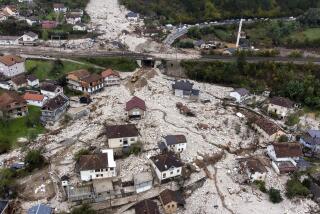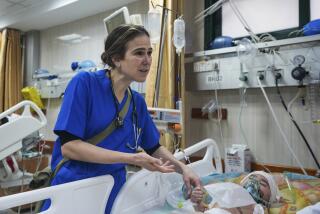Muslims Tell of Torture, Killings in Croat Camp : Balkans: U.N. official says freed detainees described recreational slayings. Up to 2,500 are reported still held.
- Share via
SARAJEVO, Bosnia-Herzegovina — A U.N. official who interviewed more than 100 Muslims released from a Croatian-run detention camp related horror stories Monday of sexual torture, executions and recreational killing that appear to copy the depraved abuses inflicted on Muslims by Serbian nationalists a year ago.
About 450 male victims of “ethnic cleansing” in the volatile Neretva River valley have made their way to the beleaguered Muslim city of Jablanica after being released from a prison in the village of Dretelj, where as many as 2,500 others are still being held, the survivors said.
They said they were held in a stifling, feces-strewn hangar with hundreds of prisoners packed together so tightly they could not lie down.
One man with broken ribs and huge lumps on his back from the untreated fractures claimed that Croatian jailers had forced his 16-year-old son to inflict the beatings, said Kirsten Young, an officer with the Office of the U.N. High Commissioner for Refugees.
Young, an Australian who has visited Jablanica twice over the past week to assess the plight of about 10,000 Muslims driven there by Croatian soldiers, relayed her report to the U.N. refugee office here by radio.
“The utter despair and humiliation of the men was extremely depressing to witness,” Young told U.N. refugee spokesman Ray Wilkinson.
The reports have not been independently confirmed. But they bear a striking similarity to reports of the massacre and cremation of thousands of Bosnian Muslims detained at Serbian-run camps in northern Bosnia-Herzegovina a year ago.
Those released from Dretelj said they were the oldest and weakest of the thousands of adolescent and adult men rounded up by Croatian nationalist forces in the Neretva River valley this spring and herded into detention camps to prevent them from defending their families against forced deportation.
All three of Bosnia’s main ethnic groups--Serbs, Croats and Muslims--have been accused of displacing civilians in advance of a forced ethnic division of this strife-torn country, but the Bosnian Croat army, known as the HVO, has been blamed by international aid workers for most of the expulsions and for the most brutal application of ethnic cleansing.
The HVO excesses, which have reportedly occurred routinely since early spring, have prompted some U.S. and European political leaders to call for economic sanctions against Croatia, which arms and supplies the HVO forces through Bosnian Croat warlord Mate Boban.
The Muslim men now in Jablanica were herded en masse to the edge of Muslim-held territory on the night of Aug. 31 and were ordered to strip to their underwear at the last Croatian checkpoint at the village of Vrdi, Young quoted the survivors as saying.
Four men were machine-gunned to death at the dark crossing point, causing the rest of the prisoners to run in terror as gunfire erupted around them, Young said she was told.
Others told her of appalling conditions at the camp, which is believed to have been operating since thousands of Muslim men were rounded up around the city of Mostar in May.
The men were deprived of water for days at a time, forcing them to drink their own urine to avoid death by dehydration, Young reported.
She said she visited one man in a Jablanica hospital who had sustained injuries to the head and torso and from anal penetration with blunt objects.
Those interviewed claimed to have lost 20 to 60 pounds during their detention, and many were thoroughly emaciated, Young said.
The Dretelj camp had no shower facilities, and most of the men told Young they had not bathed once during their months-long detention.
Young reported seeing numerous cases of scabies and physical wounds corroborating the men’s claims of having been beaten with wooden staves.
Some related incidents of deadly harassment by drunken Croatian soldiers, who reportedly fired machine guns into hangars at night, wounding or killing inmates for sport.
The Dretelj camp is just a few miles south of the city of Mostar, which was largely populated by Muslims before the current conflict but has become the target of Bosnian Croat aggression because Boban has proclaimed it the capital of the new state of Herzeg-Bosna he claims to preside over.
Most of the region is closed to aid workers, U.N. soldiers and foreign journalists because of armed roadblocks erected by Croatian HVO troops.
Jablanica is also inaccessible on most days because of fierce fighting along the mountain roads leading to the city situated on what is now Bosnia’s most dangerous ethnic fault line.
The U.N. refugee agency has managed to get only one convoy of food and medicine to the city over the past month, and officials fear it might become the scene of mass starvation or epidemics in the coming weeks.
Bosnian Muslims and Croats were allied in their efforts to repel a Serbian assault on many areas of the republic for most of last year. But after Western governments failed to intervene or effectively censure the Serbian nationalists, Croatian troops in this republic’s rugged central and southern regions began resorting to similar practices to take territory for an ethnic state of their own.
The Muslim-led Bosnian government now controls less than 10% of the republic, a fact that has placed it at a sharp disadvantage at Geneva-based peace talks where the Serbian and Croatian nationalists have been able to dictate the terms for an end to the war.
An estimated 200,000 Bosnians--mostly Muslim civilians--have been killed since the Serbian forces began besieging the republic in April, 1992. More than 2 million people, or nearly half of Bosnia’s original population, have been driven from their homes by the ensuing combat and by ethnic cleansing.
More to Read
Sign up for Essential California
The most important California stories and recommendations in your inbox every morning.
You may occasionally receive promotional content from the Los Angeles Times.











